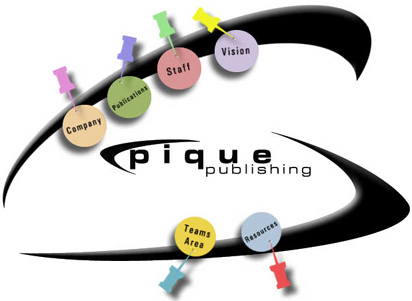Having taught courses on political development and Latin American
politics for over 30 years, John Deiner firmly believes that "students
learn best by actively processing, integrating, and presenting information,
particularly when they encounter concepts, values and cultures for the
first time."
Deiner, an associate professor in Political Science and International
Relations as well as an assistant dean in the University's Parallel
Program, has turned to the Internet and MyCourses to provide his students
with the kind of active learning experience that fosters full understanding
of complex concepts.
Deiner's class, Introduction to Politics in Developing Countries (POSC211),
is "an introductory course in non-western political processes that focuses
on the forces affecting politics in emerging nations," Deiner explained.

To facilitate student involvement, Deiner runs the class as a corporate
simulation: the class forms the fictitious Pique Publishing group, publishers
of newsletters that cover current events worldwide.
During much of the semester, the students work in groups to gather
and analyze information related to social, economic, and political events
in selected developing countries. Each group is assigned the tasks of
researching events, trends and issues in one country and of then presenting
that research in articles posted to online newsletters on the class
MyCourses site. In addition, each group makes formal presentations to the
class based on the articles posted on line.
"One of the reasons I have the students use the Internet is that I
want them to do research on specific countries using current sources,"
Deiner said. The Internet provides the students with access to a wide
array of international sources, guaranteeing current information from
a variety of viewpoints.
Deiner's students discover that evaluating the information they find
is an extremely important part of the learning process. Publishing their
newsletters online at the class MyCourses site helps the students formalize
their evaluations, coming to terms with how biases and differences in
values can lead to differences in the reports they find online. Formally
evaluating each other's newsletters and in-class presentations reinforces
this process for the students.
 The Pique Publishing simulation includes clearly defined roles for each
member of each work group: editor, columnist, reporter, and media specialist.
Deiner said that the students rotate through the roles over the course
of the semester so that each student can experience each role. In addition
to using MyCourses to upload their newsletters, the students use its discussion
and chat features to simulate "online meetings," allowing the students
to collaborate on their work outside of class time.
The Pique Publishing simulation includes clearly defined roles for each
member of each work group: editor, columnist, reporter, and media specialist.
Deiner said that the students rotate through the roles over the course
of the semester so that each student can experience each role. In addition
to using MyCourses to upload their newsletters, the students use its discussion
and chat features to simulate "online meetings," allowing the students
to collaborate on their work outside of class time.
"Simulating the roles in a publishing company provides the students
with a good model for how to work with complex material in a group,
how to find the information, how to analyze and evaluate it, and how
to best present the information," Deiner said. "The students say that
they liked the active participation in preparing the work and that the
process lets them learn a great deal about the country on which their
group focused."
 According to Justin Schakelman, the educational technology consultant
at PRESENT who helped Deiner develop the course material, "Professor
Deiner's students make aggressive use of MyCourses tools, including the
MyCourses Student Presentations Tool to post their newsletters."
According to Justin Schakelman, the educational technology consultant
at PRESENT who helped Deiner develop the course material, "Professor
Deiner's students make aggressive use of MyCourses tools, including the
MyCourses Student Presentations Tool to post their newsletters."
In part because the class is offered at the University's Georgetown
campus and in part because of the complexity of the tasks required,
Schakelman and his colleagues in the PRESENT developed a training CD
for the students, using screen action video to demonstrate the technical
concepts the students needed to master.
"We developed the CD so that the students could take full advantage
of Deiner's vision of technology's role in the course."
Like many of the courses offered at the Georgetown campus, the course
attracts a lot of non-traditional college students. Deiner indicated
that "about a fifth of the students are 'very non-traditional' in terms
of age or occupation, about a fifth of the students are of a traditional
'college age' but work on their families' farms, and all of the students
work at least 20 hours a week in addition to taking classes in the University
Parallel Program." The students' experiences in the work force makes
the Pique Publishing simulation an excellent way of getting the students
more involved in the learning process.
Given the mix of students in the class, Deiner knew that he needed
technology to make the class successful: Deiner maintains and controls
the entire process using .
The POSC 211 MyCourses site provides the students with ready access to
the syllabus; information about the Pique Publishing simulation, including
expectations for each role within the simulation; tip sheets for newsletter
publication; model newsletters from previous semesters; discussion and
meeting areas; class handouts; and the forms used by Deiner and his
students to evaluate the published newsletters. In short, the class
MyCourses site makes it easy for students to jump into their work at Pique
Publishing, even providing tools for asynchronous collaboration on each
group's newsletters.
 "Most of the students start out knowing very little about other countries
but have strong opinions about some of those countries," Deiner said.
But the material they find on line, the way they work as a group to
evaluate that material, the active work they do to present their results,
and the evaluations of each other's newsletters and presentations often
lead the students to have an awakening.
"Most of the students start out knowing very little about other countries
but have strong opinions about some of those countries," Deiner said.
But the material they find on line, the way they work as a group to
evaluate that material, the active work they do to present their results,
and the evaluations of each other's newsletters and presentations often
lead the students to have an awakening.
"They come to realize that we can do certain things in our country
because of the resources, educational systems, and political structures
in place; that the 'American way' is determined by those factors. By
being exposed to information about other countries and cultures and
by coming to terms with some of the political, economic, social, and
educational factors that shape events and values in those countries,
towards the end of the course the students come to think much more seriously
about their own values and develop more empathy for other cultures and
values."
Note: This project was supported by a technology assistance grant administered
by PRESENT.
